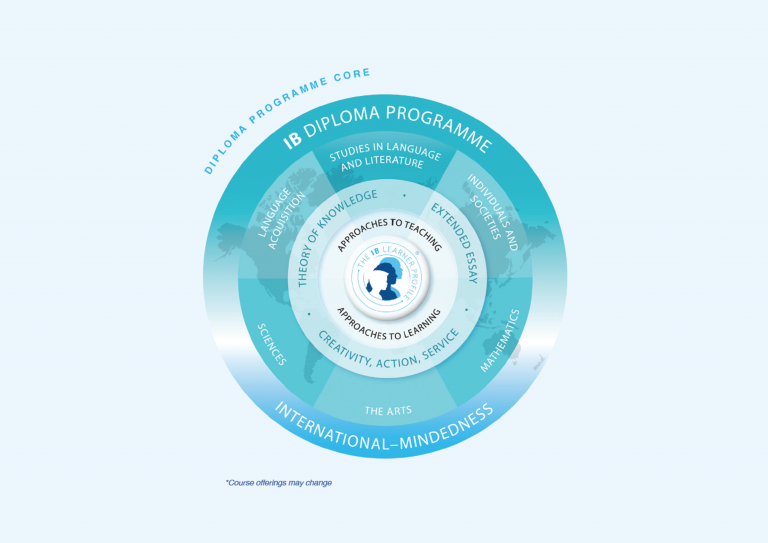IB English A: Language and Literature Course, and Guidance

IB English A: Language and Literature course will introduce critical study and also interpretation over written and spoken texts. This subject is part of the broader IB curriculum, which is internationally recognised for its emphasis on holistic and inquiry-based learning. As one of the cornerstones of international education, it prepares students to think critically and express ideas across cultural and linguistic boundaries. This course covers a wide range of literary and non-literary texts, offering students diverse opportunities for interpretation and analysis.
The analysis of the texts will be supplemented by the consciousness that a certain meaning is not a fixed one. Meaning can change depending on the contexts of the production and also consumption.
The IB English A: Language and Literature consists of three areas of exploration and seven main concepts. It is focused on the study of literary and non-literary texts.
The three areas will allow students to learn and explore a certain language thoroughly from its development of culture, cultural use, media forms and functions, and its literature. This exploration also helps students to understand the interplay between language and culture, promoting a global perspective that is essential in today’s interconnected world.
Students will then develop certain skills to analyze literature and text. Therefore they can show their ability to present their ideas in an effective way. These skills include critical thinking and literary analysis, which are fundamental for students’ academic growth. Through consistent practice, they will also enhance their academic writing skills essential for success at university level.
Key Features of the Curriculum and Assessment Models of IB English A: Language and Literature Course
Learn about the key features of the curriculum and assessment models of the IB English A: Language and Literature course. Here you will understand the main difference between this curriculum and the other:
- The IB English A: Language and Literature is available in a higher standard level which requires a minimum of 240 class hours. This is different from the standard level study that only requires a minimum of 150 class hours.
- Students will study 6 works at a higher level and 4 works standard level. It is taken from a representative selection of literary periods, places, and forms.
- Students will engage with a broad spectrum of non-literary texts, encompassing different text types, media formats, and communicative contexts.
- The students will also develop certain techniques that will be needed for critical analysis of communication, and understanding the interactions between the text.
- Students will have an understanding regarding how language, culture, and also context will form the construction of meaning using text exploration. This exploration is studied in translation, from different cultures, periods, literary forms, and types of text.
- The students will be assessed using a combination of formal examinations, oral, and written forms.
- Formal examinations for students is a two essay paper. One will require and analysis of the unseen text of non-literary. While the other is a comparative response to a question that is based on two literary works that the students have studied.
- The students will also perform an activity to present their analysis of a non-literary body of work and a literary work in an oral form.
- Students from higher levels will follow an additional coursework requirement. This requirement consists of writing an essay of 1200 to 1500 words on one work or body of work that they have studied.
IB English A: Language and Literature Descriptions and Aims
IB English A: Language and Literature course is aiming at studying the complex and also dynamic forms of language. Then try to explore its practical and aesthetic parts of language. The programme will also try to understand the important role that of a language in a form of communication, reflects one’s experience, and also shaping the world. It will also discover the roles of individuals in producing languages.
Students will try to explore diverse ways in which the language, types of text, literary forms, and elements of context will affect its meaning. Using close analysis of a wide range of types of text and literary forms, the students will discover that their interpretation and the perspectives of others are shaped by the cultural belief system.
The aim of IB English A: Language and Literature course will allow students to:
- Develop their skills of listening, speaking, writing, reading, and reviewing.
- Engage with a different range of texts from various media and from. These texts will be taken from different periods, cultures, and styles.
- Improve the skills in analysis, interpretation, and evaluation.
- Develop understanding regarding the relationship between text and different perspectives, cultural contexts, and world issues. Students will also appreciate on how those will contribute to different responses and meanings.
- Deepen their understanding of how literature and language relate to other disciplines, encouraging interdisciplinary thinking.
- Collaborate and communicate in a confident manner.
Curriculum Model Overview and Assessment Model
These are the syllabus components for higher level and standard students as well as its recommended teaching hours.
- Reader, writers, and text; higher level students will be recommended for 80 of teaching hours while standard level students are recommended for 50 of teaching hours.
- Time and space; higher level students will be recommended 80 of teaching hours while standard level students are recommended for 50 of teaching hours.
- Intertextuality; higher level students will be recommended for 80 of teaching hours while standard level students are recommended for 50 of teaching hours.
Students will also follow the assessment model objectives such as:
- Knowing, understanding, and interpreting a wide range of texts and works of literature, understanding the context of text, elements of literary works, and many more.
- Students will analyse and evaluate the uses of literary elements and their effects, and analyse the relationship between different texts.
- Students will communicate their ideas clearly and persuasively. They will also learn to communicate emotion and characters through performance.
The Difference between English A: Language and Literature & IB English Literature Course
The IB Literature is focused on literary texts and learning about their approaches, the nature of literature, and its relation with the world. The work will consist of three types of work such as translation, work of original in the source language, and free texts of choice.
The exam for IB Literature consists of two papers. One is about the analysis of passages in different literary forms and the other is a comparative essay.
The IB English A: Language and Literature will try to understand the world of literature in a different range of texts and media. The main syllabus is readers, writers, and texts; time and space; and intertextuality.
Students will be assessed in the same way which is to write papers. They also need to do a presentation. The higher level students will need to submit an essay of 1200 to 1500 words.
Conclusion
The IB English A: Language and Literature Diploma Programme is a pre-university course designed for students aged 16 to 19. This programme will encourage students to be critical in solving complex problems, perform better in academic, socially, and emotionally.
Interested in how the IB English A: Language and Literature course at BINUS SCHOOL Simprug can support your child’s growth? Discover our holistic learning approach and book a consultation with our admissions team today.



